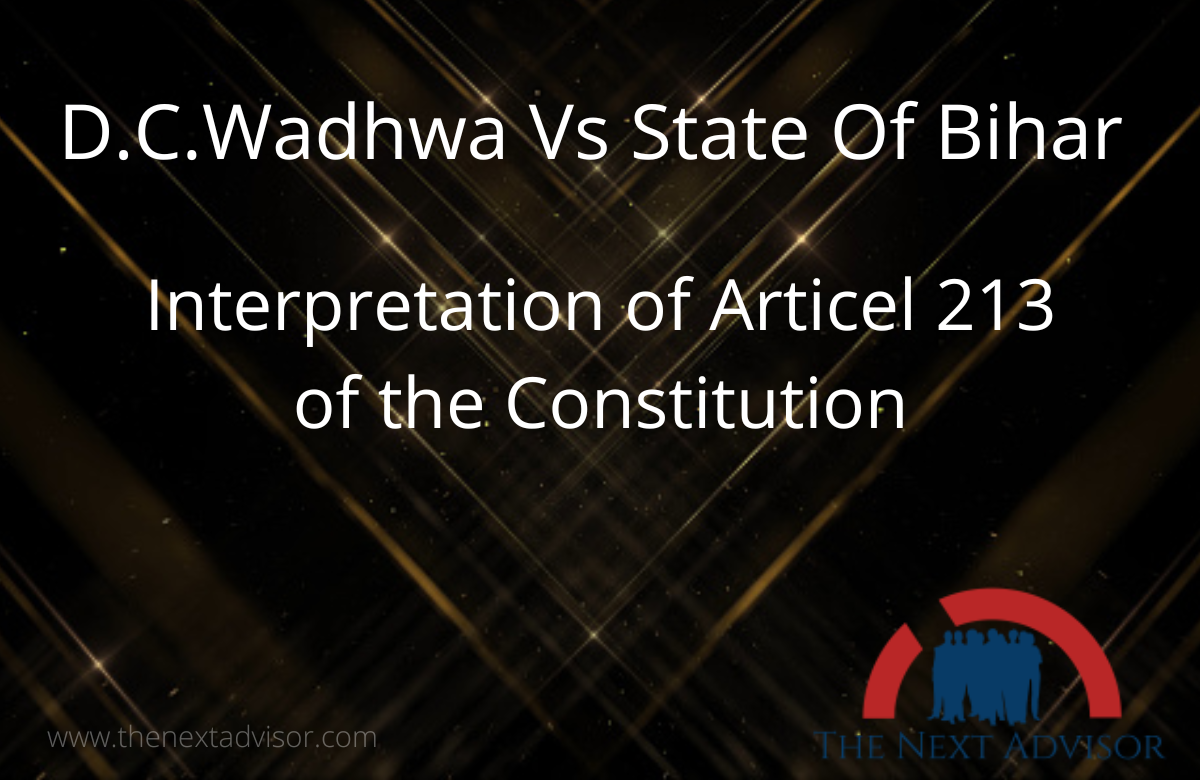The D.C.Wadhwa Vs State Of Bihar is a very famous case to understand Article 213 of the constitution. In the D.C.Wadhwa Vs State Of Bihar, Supreme Court has given the perfect interpretation of Article 213 of the constitution.
Facts of the case named D.C.Wadhwa Vs State Of Bihar
The writ petitions were filed by four petitioners challenging the practice of the State of Bihar in promulgating and – promulgating Ordinance on a massive scale and in particular, they challenged the Constitutional validity of three different Ordinances issued by the Governor of Bihar, namely,
Facts of Case named the D.C.Wadhwa Vs State Of Bihar
( i ) The Bihar Forest Produce ( Regulation of Trade ) Third Ordinance, 1983,
( ii ) The Bihar Intermediate Education Council Third Ordinance, 1983, and
( iii ) The Bihar Supply ( control ) Third Ordinance, 1983. The petitions under Article 32 of the Constitution raised the questions relating to the power of the Governor under Article 213 of the Constitution to re – promulgate ordinances from time to time without getting them replaced by Acts of the legislature.
Issues of the D.C.Wadhwa Vs State Of Bihar
Can the Governor go on promulgating Ordinances for an indefinite period of time and thus take to himself the power of the legislature to legislate though the power was conferred on him under Article 213 only for the purpose of enabling him to take immediate action at a time when the legislative assembly of the State was not in session or when in a case where there was a Legislative Council in the State, both House of Legislature was not in session.
The decision of the D.C.Wadhwa Vs State Of Bihar
The Supreme Court held that the determination of this question depends on the true interpretation of Article 213 which confers power on the Governor of a State to promulgate ordinances.
1. The power conferred on the Governor to issue Ordinances is in the nature of an emergency power which is vested in the Governor for taking immediate action where such action becomes necessary at a time when the legislature is not in session.
2. Every ordinance promulgated by the Governor must be placed before the legislature and it would cease to operate at the expiration of six weeks from the reassembly of the legislature or if before the expiration of that period a resolution disapproving it is passed by the legislative assembly and agreed to by the legislative council if any. Decision
3. The power to promulgate an ordinance is essentially a power to be used to meet an extraordinary situation and it cannot be allowed to be ” perverted to serve political ends “.
The law-making function is entrusted by the Constitution to the legislature to pass the necessary Act, but if the executive were permitted to continue the provisions of an ordinance in force by adopting the methodology of re promulgation without submitting to the voice of the legislature, it would be nothing short of usurpation by the executive of the law-making function of the legislature.
The court observed that the executive in Bihar has almost taken over the role of the legislature in making laws, not for a limited period but for years together in disregard of the Constitutional limitations, and accordingly struck down the Bihar Intermediate Education Council Ordinance 1985 which was in operation as unconstitutional and void.
The ratio of The Case – Repeated promulgation of the same ordinance is a fraud on the Constitution.



























